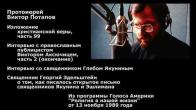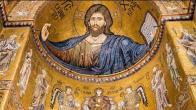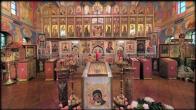You are here
Parthenius, bishop of Lampsacus on the Hellespont
7/20 February
Hierarch Parthenius, bishop of Lampsacus, was a native of the town of Melitopolis (Asia Minor), where his father, Christopher, served as a deacon. The youth was not taught letters, but he assimilated Divine Scripture well, being present in church at the divine services. He had a good heart, and, engaging in fishing, he distributed the money earned by him to the poor. Filled with God's grace, Saint Parthenius, from the age of eighteen, healed illnesses, expelled demons and worked other miracles through Christ's name. Having learned of the youth's virtuous life, the bishop of Melitopolis, Philip, gave him an education and ordained him a presbyter. In 325, during the reign of Constantine the Great, the archbishop of Cyzicus, Achilles, installed him as bishop of the town of Lampsacus (Asia Minor). In the town was a multitude of pagans, and the hierarch began to spread faith in Christ diligently, confirming it in accordance with God's will by many miracles and healings of the sick.
People began to leave pagan beliefs, and then Hierarch Parthenius set off for the Emperor Constantine with a request that he be given authority to demolish the temples of the idols and build Christian churches in their place. The Emperor received the Hierarch with honor, gave him a document for the destruction of the temples and provided him with means for the construction of a church. Upon returning to Lampsacus, Hierarch Parthenius ordered that the temples of the idols be demolished and a beautiful church of God be raised up in the middle of the town.
Finding at one of the destroyed temples a large stone suitable for constructing the holy altar in the church, the Hierarch ordered that it be dressed and brought to the church's building site. Through the malice of the devil, who had become enraged over the taking of the stone from the temple, the conveyance overturned and the stone killed the driver, Eutychian. Saint Parthenius resurrected him by his prayer and put the devil to shame, who wanted to impede God's work.
The Hierarch's mercy was so great that he did not refuse healing to any of the multitude of people suffering from bodily ailments and possessed by unclean spirits that came to him or were encountered by him on the roads. The people stopped turning to physicians, since Saint Parthenius healed all illnesses in the name of the Lord Jesus Christ without remuneration. By the great power of Christ's name, the Hierarch expelled a multitude of demons from people, houses and the waters of the sea. When the hierarch expelled a demon from a man who had been possessed by it from childhood, the unclean spirit began to ask the Saint to give him another place of habitation. The Saint promised to indicate such a place and, having opened his mouth, said to the demon: "Enter and inhabit me." The devil, as if singed by fire, cried out: "How shall I enter into God's house?" and hid himself in deserted and impassable places. An unclean spirit, expelled by the Hierarch from a home where royal purples were manufactured, shouted in the hearing of all that the divine fire was driving him into the fiery Gehenna.
Thus, manifesting to men the great power of faith in Christ, the Hierarch converted a multitude of idolators to the true God.
Hierarch Parthenius deceased peacefully and was triumphantly buried next to the cathedral church of Lampsacus, in a chapel built by him himself.
Relics in cathedral - monthly calendar
| S | M | T | W | T | F | S |
|---|---|---|---|---|---|---|
|
|
|
|
1
|
2
|
3
|
4
|
|
5
|
6
|
7
|
8
|
9
|
10
|
11
|
|
12
|
13
|
14
|
15
|
16
|
17
|
18
|
|
19
|
20
|
21
|
22
|
23
|
24
|
25
|
|
26
|
27
|
28
|
29
|
30
|
31
|
|
PARISH LIFE
Address of our Cathedral
While all the materials on this site are copyrighted, you may use them freely as long as you treat them
with respect and provide attribution on the Russian Orthodox Cathedral of St.John the Baptist of Washington DC.









